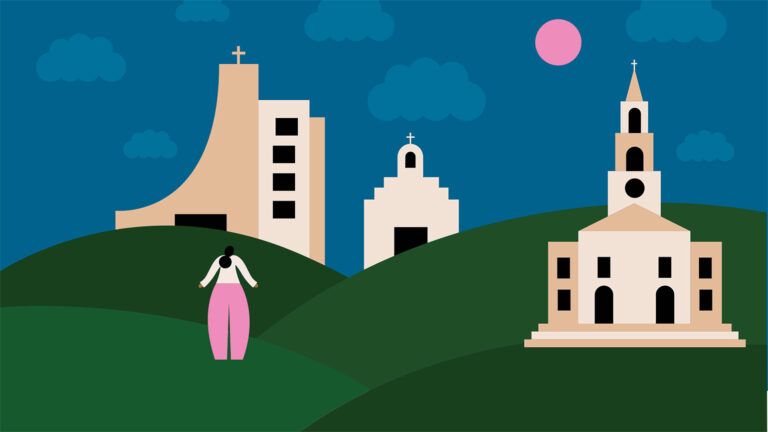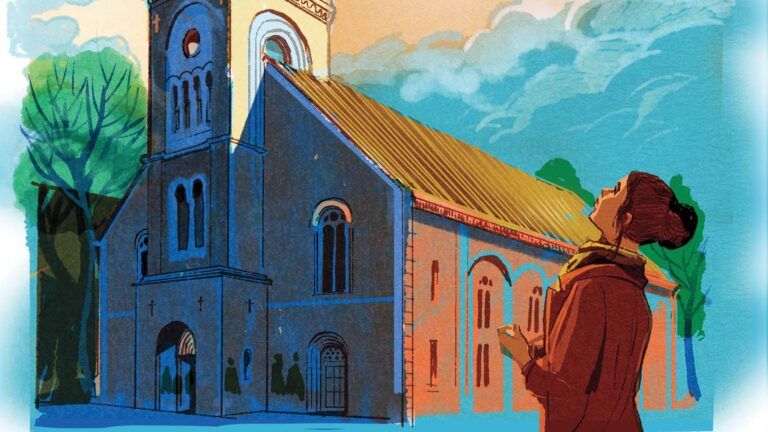It had been dark for days when I finally heard the doctor’s voice. “Lieutenant Smiley?”
I knew from his tone that the news wasn’t good. How could it be? I was lying in a bed in Walter Reed Army Medical Center. I had memories of an explosion in Mosul, in northern Iraq—a car driving toward my armored combat vehicle, me waving it back, shouting. Then hot, white light and loud noise. Then nothing.
“We performed the final surgery last night,” the doctor told me. Since my injury two weeks before, military doctors in Iraq, Germany and the U.S. had operated on me several times, removing shrapnel from my head and eyes and cutting my skull open to relieve the swelling in my brain. For most of that time I had been in a medically induced coma. “I’m sorry, Lieutenant Smiley,” the doctor continued. “There’s nothing more we can do for you. Your blindness is permanent.”
I opened my eyes as wide as they would go, staring hard toward his voice, as if somehow I could capture light by a sheer force of will. I knew my wife, Tiffany, was in the room. I sensed my mom out in the hall—she must have left to cry. I wasn’t going to cry, though.
“Scotty,” said Tiffany softly, laying a hand on my arm.
I jerked my arm away. “I’m fine,” I said gruffly. I tried rearranging the doctor’s words: Blindness. Nothing more we can do. Permanent. No, it wasn’t true. Why would God have taken me so far—only for this to happen?
It had been just five years since I had entered West Point, and its beautiful campus high above the Hudson River. I felt on top of the world. I was certain, maybe even cocky, about my future. I majored in engineering management, planning to hone leadership skills during my five years of mandatory Army service, get an MBA at a top-ranked school and, to be frank, get rich. Yes, there had been some changes to that plan. For one thing, I hadn’t met many teachers at West Point who thought getting rich was a laudable goal. They believed in service, to their country and their students, and it showed. Then September 11 happened, and Afghanistan and Iraq, and I realized I’d probably be going into combat. I was nervous about that, but excited too. Joining the Army is like joining a big family. The 45 men I commanded in a Stryker armored combat platoon were loyal, brave and as close to each other as brothers. I had wanted that leadership experience, and here it was.
Lying in that hospital bed, though, all I could think was, What for? What was the point of leadership experience, my degree, my plans, if all of it was simply going to be washed away in darkness? Do you hear me, God? What was the point?
Tiffany again laid a hand on my arm, and again I brushed it away. I struggled to get out of bed and fell back in pain. My leg was injured too, and I was still hooked up to machines, a big bandage around my head. A feeling of vertigo came over me. Blindness! There was Tiffany, beside me. Quick, remember, what does she look like? Big smile, cute nose, that delicate face I had loved since high school. We had dated all through college while she went to nursing school in Spokane, Washington, seeing each other on vacations. I had shipped out for Iraq less than a year after we married. I would never see her again! Would I forget what she looked like? What must she think of me, lying here so weak?
“Scotty,” she said with a tremble in her voice I had never heard before, “remember that verse you like so much, ‘I can do all things through Christ who strengthens me.’ We’re going to get through this. It’s going to be okay.” I wanted to believe her. I had even had those words inscribed inside my class ring. But at that moment, all I could do was slump farther into my pillows and close my eyes. Like it made any difference! I said nothing and thought nothing and eventually went to sleep.
I was at Walter Reed for one month. I had to learn to walk again. I had to learn everything else too. How to shower. How to eat. I wasn’t a very pleasant patient. Every day brought new frustrations, new awareness of my limitations. I tried to do things myself, refusing help. But the fact was, I wasn’t independent. And I hated that. Men from my platoon called from Iraq, and Tiffany sat at my bedside every day, reading from the Bible, the newspaper, making small talk. I might have given up without the support. But I resented it too. It made me ashamed, magnified the question I least wanted to answer. What was I going to do with the rest of my life? Who was I, if I wasn’t the man who had entered West Point with such confidence?
The Army sent Tiffany and me to a blindness rehabilitation center in Palo Alto, California. I learned to walk with a stick and cross streets by listening to which way the traffic flowed, to distinguish coins by touch and to keep my money organized in my wallet so I could pay the right amount in stores. I learned new reflexes, putting my hand to my face anytime I entered a room, just in case something hazardous was suspended there.
Tiffany saw one positive side to my blindness: “You’ll never see my wrinkles!” I laughed at that, and I had to agree when she pointed out that every day I was mastering things I had once told myself I would never do again. Still, the terrible question of my future loomed before me.
Even before I had come out of the coma, Army officials had handed Tiffany a stack of forms—application papers for military disability. If I signed them, I would be discharged from the Army and guaranteed a lifetime disability payment. If I didn’t—well, I didn’t know what would end up happening.
I tried sending resumes out, mostly to defense contractors who might be able to use my military experience. But my heart wasn’t in it. That hadn’t been the dream. The dream, I was sure, was gone.
One day in our room, I heard Tiffany shuffle papers around on the desk and gather some up. I knew what papers they were. “We need to make a decision about this, Scotty,” she said.
“I know,” I said quietly. She made no reply, and I realized she was waiting for more. Finally, I spoke. “I don’t want to sign something that says I’m disabled. But I am disabled!”
“Are you? From doing what?” she asked.
The question was so strange, the answer so obvious, I didn’t know what to say to her.
Tiffany waited, then finally said, “Scotty, listen. You know the hospital people told me I could sign those papers for you before you woke up. And you know why I decided not to? I believed then, and I believe now, that God is watching over us. I know you can make this decision. You keep talking about this future you can’t have. But how do you know it’s the only future worth having?”
I sat back, and again I was speechless. The only future worth having. I did indeed know that Tiffany had refused to sign those papers. We had talked about them so many times, around and around, and just as often I’d thought of her there in that hospital, so scared, me practically unrecognizable in intensive care. And yet she’d had the presence of mind to be smart for me. She had believed in me. I’d been completely dependent on her. Dependent. I almost laughed. Who hadn’t I been dependent on? Doctors. My family. God, of course. Why was I so stuck on independence anyway? On my dreams for my future? I felt something shift inside me, something unclench.
“Um,” I said, and I could almost feel Tiffany strain toward my voice. “Actually, I do know of a few officers I could talk to about Army jobs I might be able to do.” I paused. “Non-combat things. What do you think?”
Tiffany didn’t even have to give me an answer. Her arms practically flew around my neck and, for the first time, I knew without a doubt that everything really was going to be okay.
Soon after leaving the blindness rehabilitation center I was transferred to Fort Monroe, Virginia, which happened to be home to a unit providing classroom training to new recruits about to ship overseas. When an officer offered me a teaching position, I didn’t hesitate. And I didn’t regret it, either.
Almost immediately, I discovered that I loved teaching. Blindness heightened all of my other senses, and I found myself often knowing exactly what my young recruits were feeling, sometimes even before they spoke. All of my old judgments about people—whether they looked sharp and ambitious like me—went out the window. My real blindness, I realized, had been before I had gone to Iraq, when sometimes all I could see was myself.
Postscript: Scott did end up going for his MBA, graduating from Duke University in 2009. In September 2010, his memoir, Hope Unseen: The Story of the U.S. Army’s First Blind Active-Duty Officer was published by Howard Books.
Download your FREE ebook, The Power of Hope: 7 Inspirational Stories of People Rediscovering Faith, Hope and Love.






